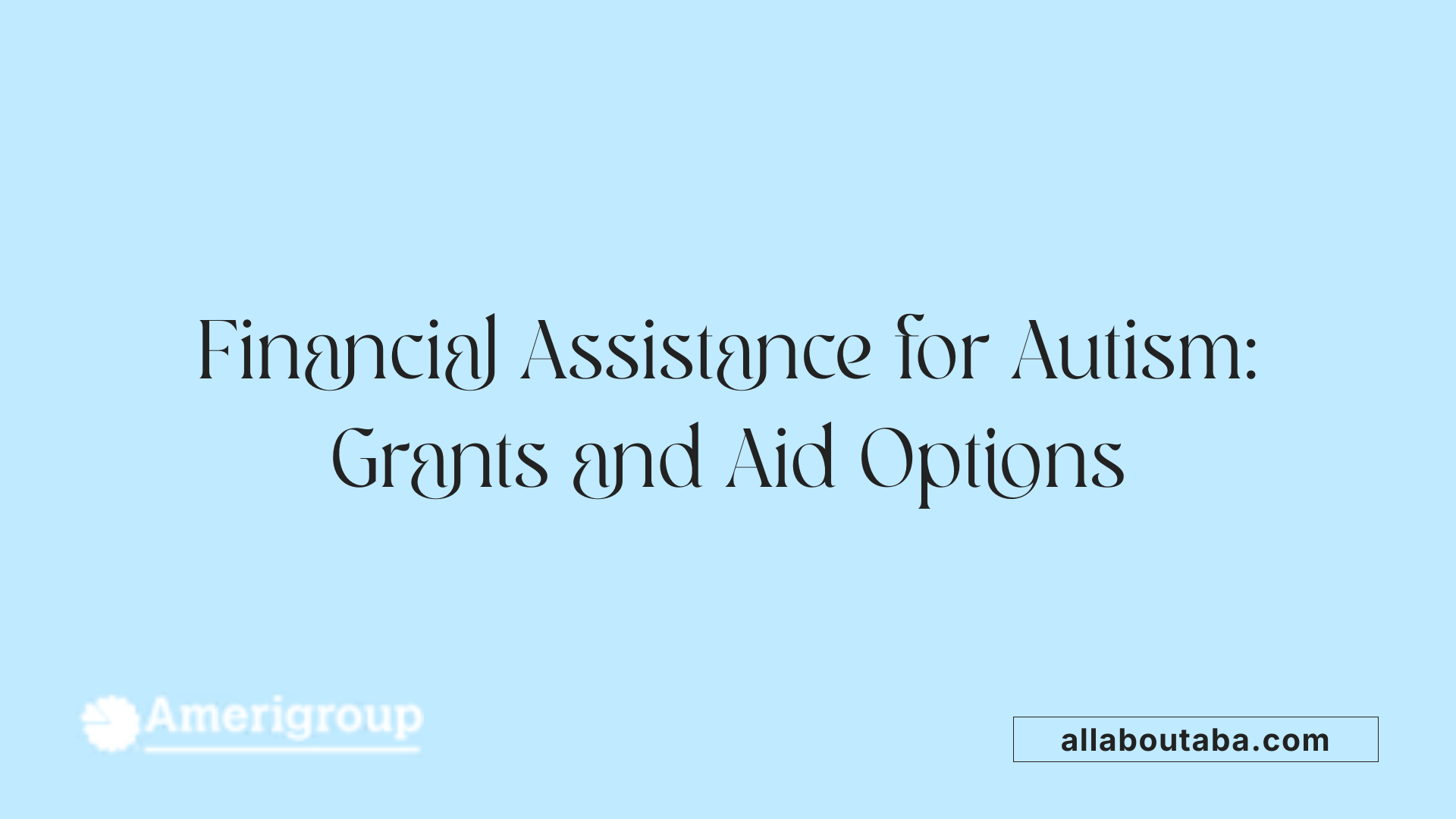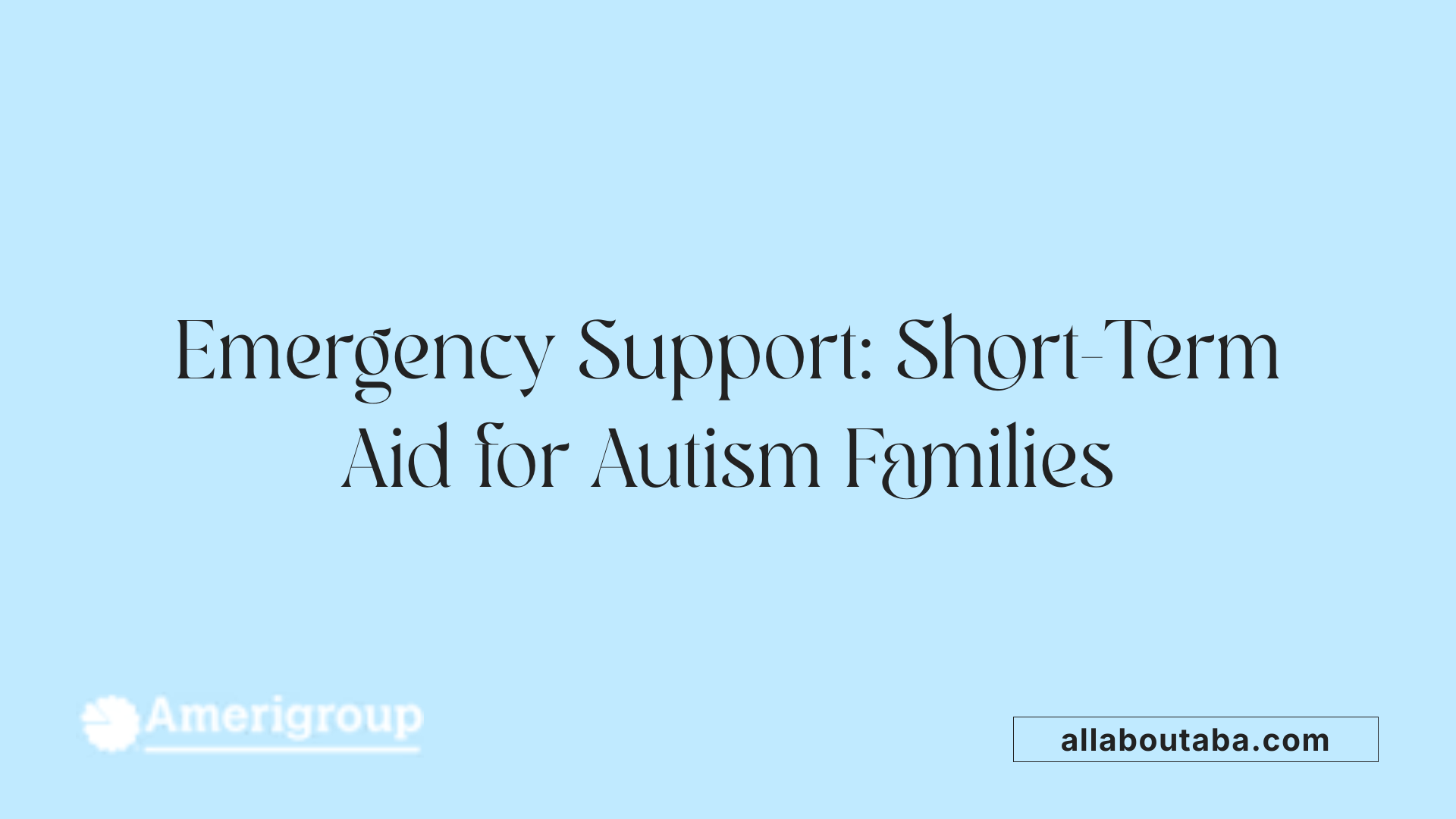Understanding How to Secure Financial Assistance for Autism-Related Needs
Families of individuals with autism often face various financial challenges related to treatment, therapies, educational needs, and ongoing support. Fortunately, numerous federal, state, and community resources can provide significant financial assistance. This article details the range of available programs, grants, tax benefits, and guidance to help families navigate these supports effectively and secure the funding they need to ensure comprehensive care and development for their loved ones.
Overview of Government Programs and Benefits for Autism Support
What government programs and benefits are available to support autistic individuals and their families?
Families with children and adults with autism can access a variety of government-supported services and financial assistance options. Federal programs such as Supplemental Security Income (SSI) and Social Security Disability Insurance (SSDI) offer financial aid based on disability and income levels. Medicaid provides healthcare coverage, including therapies, medical services, and in some states, additional support through waivers.
In addition, ABLE Accounts allow families to save funds specifically for long-term needs without affecting their eligibility for means-tested federal benefits. Early screening, diagnosis, and intervention are supported by initiatives from the Department of Health and Human Services (HHS), ensuring early access to services that can improve developmental outcomes.
Educational support is secured through laws like the Individuals with Disabilities Education Act (IDEA), which mandates free, appropriate public education, including tailored services via Individualized Education Programs (IEPs). Early intervention programs funded by the Department of Education and state agencies help children receive necessary therapies and educational adjustments.
Many states provide additional support through specialized Medicaid waivers—such as the Pennsylvania Autism Waiver—that fund services like behavioral therapies, residential supports, and employment assistance. These state-specific programs are designed to meet local needs, offering a broad spectrum of services.
Legal and healthcare frameworks also facilitate access to community resources, legal safeguards, and community-based services. This integration of federal and state programs ensures that autistic individuals and their families can receive comprehensive, accessible support tailored to their specific circumstances.
Below is a summary of supported programs and benefits:
| Program/Benefit | Description | Target Group |
|---|---|---|
| SSI | Monthly financial support for disabled children & adults | Children & adults with severe disabilities |
| SSDI | Income support for working individuals with disabilities | Autistic individuals with work history |
| Medicaid | Healthcare coverage including therapies and services | Low-income families, individuals |
| ABLE Accounts | Savings plans for long-term needs | Families of disabled persons |
| Early Intervention Programs | Developmental support for young children | Children under 3 |
| IDEA and IEPs | Educational support and services in schools | School-age children |
| State Medicaid Wavers | Customized services like behavioral therapies | Eligible individuals in specific states |
With these programs, families can access a broad range of supports designed to improve quality of life, promote independence, and reduce the financial burden associated with autism spectrum disorder.
Types of Financial Aid and Grants for Autism

What type of financial aid or grants are available for individuals with autism?
Families and individuals seeking support for autism-related expenses have access to a broad range of financial resources. Federal programs such as Supplemental Security Income (SSI) and Social Security Disability Insurance (SSDI) offer crucial financial benefits. SSI provides monthly cash assistance and often grants automatic access to Medicaid, helping cover health care and support services. SSDI supports those who have a work history and qualify based on disability criteria.
State-level programs further supplement federal aid, with Medicaid Waivers being particularly significant. These waivers provide services like therapies, respite care, transportation, and in-home support, tailored to the specific needs of each person. However, many states maintain waiting lists, so early application after diagnosis is recommended.
Nonprofit organizations play an essential role by offering grants and scholarships. Autism Speaks, the Autism Spectrum Disorder Foundation, and Autism Care Today are just a few examples. These organizations fund therapies, communication devices, summer camps, and equipment to help promote independence and improve quality of life.
In addition to direct grants, financial planning tools like ABLE Accounts enable families to save money tax-advantaged to cover future needs without risking eligibility for means-tested benefits. Community agencies and local programs also provide support with essentials such as housing, utilities, emergency aid, and specialized services.
To maximize available assistance, families should promptly contact both local and national organizations. These agencies can guide them through eligibility criteria, application procedures, and how to access these vital resources.
How Families Can Apply for Autism-Related Financial Assistance
What are the application processes for SSI, SSDI, Medicaid, and waivers?
Families seeking financial help for autism-related expenses can start by exploring federal and state programs. The Social Security Administration (SSA) handles applications for Supplemental Security Income (SSI) and Social Security Disability Insurance (SSDI). To qualify, families must provide medical documentation that demonstrates severe and marked functional impairments caused by autism. The application process involves submitting detailed medical records, income documentation, and completing specific forms either online, by phone, or in person at local SSA offices.
State Medicaid programs often require applying through a separate process, which varies by location. Many states offer Medicaid waivers tailored to developmental disabilities, including autism. Applying for these waivers typically involves initial eligibility screening, medical evaluations, and working with case managers who develop support plans. It’s important to contact local Medicaid offices or developmental disability agencies early after diagnosis to secure a place on waiting lists.
How can families use nonprofit grants and community resources?
Nonprofit organizations such as Autism Speaks and the Autism Spectrum Disorder Foundation offer grants and scholarships for treatment, therapies, and educational services. Families can visit these organizations’ websites to review available funding opportunities, eligibility criteria, and application procedures. Community resources like local parent groups, school district special education offices, and early intervention programs are also valuable sources of support.
Applying for these grants often involves filling out application forms, providing proof of diagnosis, and sometimes, letters of recommendation or involvement in community programs. These grants can be targeted for specific needs like speech therapy, communication devices, or summer camps.
What guidance exists for navigating federal and state programs?
Navigating the complex web of federal and state support programs can be overwhelming. Resources like Autism Speaks offer guidance, including online toolkits and webinars on how to access public benefits and navigate application processes. Many families find it helpful to work with case managers or advocates who understand local services and eligibility criteria.
The website of agencies such as the Autism Society, Easterseals, and local school districts can provide personalized assistance. Additionally, there are support groups and online forums where families share experiences and tips on successfully securing aid.
How do tools for financial planning and support help families?
Planning for the future is crucial. Tools like the Autism Speaks Special Needs Financial Planning Toolkit assist families in understanding how to set up financial accounts such as ABLE accounts, trusts, and savings plans that do not jeopardize benefits. These tools also provide guidance on establishing special needs wills and trusts to protect inheritance funds.
Utilizing financial planning resources helps families organize expenses for therapies, educational supports, medical care, and daily living needs. Contacting financial planners experienced in special needs planning can further ensure that families make informed decisions that secure their child’s future while maximizing available aid.
Tax Credits and Insurance Options for Autism Expenses
Are there tax credits or insurance options to help cover autism-related expenses?
Yes, families with autistic children have several financial support options through tax credits and insurance coverage. One of the main tax benefits involves medical expense deductions. Families can deduct qualified, unreimbursed medical costs such as therapy sessions, diagnostic evaluations, specialized diets, and related travel expenses, as long as these costs exceed 7.5% of their adjusted gross income (AGI). This can significantly reduce the overall tax burden.
Furthermore, families may qualify for tax credits like the Child and Dependent Care Credit, which can provide up to $3,000 per child for care expenses, including therapies and medical needs. The Earned Income Tax Credit is also available if the family meets income limits and the child's disability is recognized as permanent and total.
In addition to tax benefits, savings plans like ABLE accounts are designed specifically for individuals with disabilities. These accounts allow families to save up to $15,000 annually in a tax-advantaged manner without risking their eligibility for government benefits such as Medicaid or Supplemental Security Income (SSI).
Insurance coverage for autism-related treatments varies by policy and state laws. Many states now mandate insurance companies to cover applied behavioral assessment (ABA) therapy, which is a common and effective treatment for autism. It’s essential for families to review their individual insurance plans and understand the scope of coverage for therapies, medical expenses, and assistive devices.
State-specific laws and benefits
State laws can significantly impact the availability and scope of insurance benefits for autism. Some states have additional mandates requiring health plans to cover autism treatments, while others offer various waivers and Medicaid options tailored for developmental challenges. Families should stay informed about their state's policies and work with case managers or legal advisors to access all available resources.
Overall, understanding these federal and state options can help families reduce the financial burden of autism-related expenses, ensuring children receive the necessary care and support to thrive.
Resources for Navigating Autism Support Programs and Benefits
 There are various tools and organizations dedicated to helping families access and understand the support available for autism. Official government websites serve as primary sources of information. For example, the Social Security Administration provides guidance on applying for Supplemental Security Income (SSI) benefits, which offer monthly payments to children with severe disabilities and low income. State agencies like the Division of Vocational Rehabilitation (DVR) can assist with employment support and job training programs.
There are various tools and organizations dedicated to helping families access and understand the support available for autism. Official government websites serve as primary sources of information. For example, the Social Security Administration provides guidance on applying for Supplemental Security Income (SSI) benefits, which offer monthly payments to children with severe disabilities and low income. State agencies like the Division of Vocational Rehabilitation (DVR) can assist with employment support and job training programs.
Advocacy organizations play a crucial role in providing resources and community support. The Color of Autism Foundation, for instance, offers culturally sensitive programs, family support services, and community integration initiatives. Many organizations also facilitate support groups where parents, caregivers, and individuals with autism can share experiences, advice, and encouragement.
Educational planning is vital for ensuring children’s needs are met in school settings. Families should explore Individualized Education Plans (IEPs) and 504 Plans, which are legal tools under IDEA and the Rehabilitation Act that guarantee accommodations and specialized services. Schools often have special education teams to help develop and implement these plans. Early intervention programs, therapies like applied behavioral analysis (ABA), and assistive technologies can significantly improve quality of life.
Understanding legal rights and protections is also essential. Laws such as the Americans with Disabilities Act (ADA) and IDEA empower families to advocate for necessary services and accommodations. Connecting with local community organizations, such as autism societies, Easterseals, and parent support groups—both online and in person—further enhances access to resources.
Parents and caregivers are encouraged to thoroughly research available services, consult healthcare and educational professionals, and actively advocate for the rights and support their loved ones deserve. By navigating these resources effectively, families can secure comprehensive care tailored to the unique needs of individuals with autism.
For more detailed guidance, searching with the inquiry 'Guide to autism support programs and legal rights' can help locate specific information and recent updates.
Educational and Planning Tools for Securing Financial Help

Are there educational or planning tools to assist families in securing financial help for autism?
Yes, numerous resources are available to help families manage the financial aspects associated with autism. Autism Speaks offers a valuable resource called the Special Needs Financial Planning Tool Kit. This toolkit helps families organize and plan for their child's future needs, including medical, educational, and support services.
In addition to planning kits, organizations like Autism Speaks provide personalized assistance through their Autism Response Team, which offers guidance on navigating available programs. These include federal benefits such as Supplemental Security Income (SSI) and Medicaid Waivers, as well as state-specific programs like ABLE Accounts and Medicaid waivers that support medical expenses, therapies, and in-home services.
Families can also explore grants and scholarships offered by various nonprofit organizations. These financial aid options target specific needs such as medical devices, communication tools, therapy costs, summer camps, and educational support.
To help prioritize expenses, many of these organizations provide tools and checklists that assist in managing ongoing costs related to therapy, medications, educational resources, and adaptive devices.
Planning for the future goes beyond immediate needs. Families are encouraged to work with case managers and legal professionals to establish special needs trusts and to learn about tax benefits, such as medical expense deductions and the child and dependent care credit, which can alleviate financial burdens.
Overall, these educational and planning tools are designed to empower families. They enable them to navigate complex funding systems, prepare for future expenses, and secure the necessary resources to support their child's development and well-being.
For further assistance, families are advised to search for "Financial planning tools for autism families" to find tailored resources, webinars, and community programs that can provide additional guidance.
Emergencies and Short-term Financial Support for Autism Families

What resources are available for emergency assistance and family grants for autism families?
Families caring for children with autism often face unexpected expenses and urgent financial challenges. Autism Speaks, along with various nonprofit organizations and local agencies, provides a range of resources aimed at offering immediate financial support in times of crisis.
Autism Speaks maintains a comprehensive list of emergency assistance programs and family grants specifically tailored to help families manage urgent needs related to medical bills, therapy costs, and even daily living expenses. These grants can be crucial when families experience unforeseen medical emergencies or financial hardships.
In addition to nonprofit efforts, many community and state programs offer emergency grants or crisis support services. These might include aid with housing, utility bills, transportation, or essential medical supplies. Such programs are designed to provide quick relief and stabilize families during tough times.
It’s important for families to act promptly. Contacting local community agencies, social services, case managers, or autism support organizations immediately after diagnosis or when facing financial crises can ensure access to available help. Early engagement increases the likelihood of securing timely assistance and navigating complex application processes.
By leveraging these resources, families can better manage short-term financial burdens while focusing on the ongoing care and support their children need. Understanding the options and reaching out quickly can make a significant difference during emergencies.
Understanding Legal and Financial Safeguards for Autism Support Funding

How can families protect inheritance or savings from affecting benefits?
Many families seek ways to secure their child’s financial future without risking eligibility for vital public benefits. One effective approach is establishing a special needs trust or a comprehensive legal safeguard. These legal arrangements are specifically designed to hold assets such as inheritance, savings, or other resources.
A special needs or supplemental needs trust is a separate legal entity that manages funds for the benefit of an individual with autism. When properly drafted, these trusts ensure that the assets do not count as resources for means-tested programs like Medicaid or SSI. This way, families can preserve resources for the child’s education, healthcare, and future needs.
Creating these trusts requires careful legal planning. Professionals with expertise in special needs law can help draft documents that align with state and federal regulations. Proper legal safeguards prevent assets from disqualifying an individual from public assistance, while still enabling access to benefits.
It’s important that families work with qualified attorneys who understand the nuances of disability law. A well-structured trust can be the difference between financial security and loss of essential benefits. Overall, legal safeguards and estate planning are critical for protecting resources and supporting a person with autism long-term.
Additional considerations
- Trusts should be tailored to meet individual needs and comply with specific state laws.
- Funding sources, such as inheritance or gifts, should be directed into the trust.
- Unused funds in the trust can sometimes be used for supplemental items not covered by government programs, enhancing quality of life.
More Information
For further insights on protecting assets and planning estate strategies, families can search using the query: "Legal safeguards and trusts for autistic individuals' funding." Consulting an attorney with experience in special needs legal planning ensures comprehensive protection and peace of mind.
Navigating the Financial Landscape for Autism Support
Accessing financial assistance for autism can be complex, but with a clear understanding of available programs, grants, tax benefits, and legal safeguards, families can significantly ease their financial burdens. Utilizing resources from government agencies, nonprofits, and community organizations, and by employing effective planning tools, families can ensure that their loved ones receive the necessary care and support. Staying informed, proactive, and supported by the right guidance makes it possible to build a secure and enriching future for individuals with autism.







